democracynow.org
Stories:

Trump's Deal That "Saved Jobs" at Carrier Based on a $7 Million Tax Break & Reduced Regulations
President-elect Donald Trump kicked off his victory tour Thursday by touting his involvement in Carrier’s decision to keep some jobs in the U.S. instead of moving them all to Mexico. Carrier is a multibillion-dollar company, and the Pentagon is the largest customer of its parent company, United Technologies. Trump said the deal for Carrier to keep the jobs in state reportedly includes a $7 million incentive package with tax breaks and reduced regulations. Meanwhile, about 1,000 workers for the company in Indiana will reportedly still lose their jobs. We speak with Public Citizen’s president, Robert Weissman.
TRANSCRIPT
This is a rush transcript. Copy may not be in its final form.
AMY GOODMAN: President-elect Donald Trump kicked off his victory tour Thursday at a rally in Indiana, where he celebrated his involvement in Carrier’s decision to keep some jobs in the U.S. instead of moving them all to Mexico.
PRESIDENT-ELECT DONALD TRUMP: So many jobs are leaving and going to other countries, not just Mexico, many, many countries. And China is making so much of our product that we’re closing up a lot of plants. And, I mean, I wrote down some numbers that are incredible, but the numbers of manufacturing jobs that are lost, especially in the Rust Belt—and the Rust Belt is so incredible, but we’re losing companies—it’s—it’s unbelievable, one after another. United Technologies and Carrier stepped it up, and now they’re keeping—actually, the number is over 1,100 people, which is so great, which is so great.
AMY GOODMAN: Carrier is a multibillion-dollar company that makes air conditioners. The single largest customer of its parent company, United Technologies, is the Pentagon. Trump said the deal for Carrier to keep the jobs in state reportedly includes a $7 million incentive package with tax breaks and reduced regulations.
PRESIDENT-ELECT DONALD TRUMP: One of the things we’re doing to keep them is we’re going to be lowering our business tax from 35 percent hopefully down to 15 percent, which would take us from the highest taxed nation virtually in the world—this is terrible for business—to one of the lower taxed, not the lowest yet, but one of the lower taxed. The other thing we’re doing is regulations. ... About six years ago, 260 new federal regulations have passed, 53 of which affect this plant—53 new regulations, massively expensive, and probably none of them amount to anything in terms of safety or the things that you’d have regulations for.
AMY GOODMAN: Meanwhile, it’s believed more than a thousand workers for the company in Indiana will reportedly still lose their jobs. Carrier employees at the plant in nearby Huntington, Indiana, were handed letters under the header, "Company Update on Indianapolis Operations." The announcement read, quote, "While this announcement is good news for many, we recognize it is not good news for everyone. We are moving forward with previously announced plans to relocate the fan coil manufacturing lines, with the expected completion by the end of 2017." They’re closing the Huntington plant.
This comes as Donald Trump announced plans to leave his businesses. In a series of tweets Wednesday morning, he tweeted, "I will be holding a major news conference in New York City with my children on December 15 to discuss the fact that I will be leaving my great business in total in order to fully focus on running the country in order to MAKE AMERICA GREAT AGAIN! While I am not mandated to do this under the law, I feel it is visually important, as President, to in no way have a conflict of interest with my [various] businesses. Hence, legal documents are being crafted which take me completely out of business operations. The Presidency is a far more important task!" he wrote.
After Trump’s Twitter announcement, the Office of Government Ethics responded with a tweet storm of its own, writing, quote, "@realDonaldTrump Bravo! Only way to resolve these conflicts of interest is to divest. Good call!" and "@realDonaldTrump this divestiture does what handing over control could never have done," unquote. Ethics experts say Trump must divest from his business interests to avoid conflicts of interest.
Well, for more, we’re joined by two guests. We’re starting with Robert Weissman, president of Public Citizen, who’s been following what he calls "Trump’s corporate takeover of federal agencies" and has written that "Trump’s conflicts of interest are unprecedented in American history."
But I want to start, Rob Weissman, by talking about Carrier and what exactly is understood at this point. Now, it sounds like about 800 jobs are going to be saved, while about 1,100 jobs will be lost with the closing of one of the Carrier plants. But this is all as a result of a $7 million tax break, is that right, for Carrier?
ROBERT WEISSMAN: Yeah, that seems to be right. You know, Trump, yesterday in his speech, said companies that leave the United States to take jobs out will be punished, one way or another. But, in fact, what this deal is about is paying a bribe to Carrier to stay—and, you know, as you were saying in the lead up, not really stay. Some jobs stay, not the number he said, on terms that are unknown, for a time that’s unknown. We do know that in the past these kinds of deals to pay subsidies to retain jobs or to get new jobs typically don’t work and that the jobs that are promised don’t materialize, or the jobs that are supposed to stay don’t stay very long.
You know, it’s also interesting that he said, in the clip you played, part of the way he allegedly convinced Carrier to keep these hundreds of jobs in Indiana is through his promise of tax cuts and wiping away regulation. Well, those tax cuts, if they’re able to be delivered on, which we surely hope we can block, actually would have nothing to do with where Carrier locates itself. It’s going to have the same tax rate whether or not it does production in Mexico or does it in Indiana. And on the regulations he talks about, you know, he has an aggregate number, but he doesn’t name a single regulation that he thinks is unfair to Carrier or that does the wrong thing for the American people. So those kinds of regulations he’s talking about wiping away include things like establishing that people who work long hours will be paid proper overtime compensation—
AMY GOODMAN: Well, I wanted to—
ROBERT WEISSMAN: —or reductions in climate emissions.
AMY GOODMAN: I wanted to turn to Donald Trump speaking last March.
DONALD TRUMP: I will call the head of Carrier, and I will say, "I hope you enjoy your new building. I hope you enjoy your stay in Mexico. Here’s the story, folks: Every single air-conditioning unit that you build and send across our border, you’re going to pay a 35 percent tax on that unit."
AMY GOODMAN: In fact, in that same speech, he decried giving tax breaks and said, "We will just tax every air conditioner that you send up from Mexico"—exactly the opposite of what is happening now, Robert.
ROBERT WEISSMAN: Right. And, you know, there are a lot of things that could be done, in this particular case, without paying bribes. As you point out, the parent company basically feeds from the Defense Department, so this is a government-dependent company. It’s one of the ones over which the U.S. government has the most leverage, without paying bribes, if it chooses to exert it. And Trump didn’t do that.
AMY GOODMAN: And then the issue of what exactly are all the promises that were made to these companies—again, promises that Donald Trump himself has decried over and over again, saying companies should be punished, not be rewarded by tax breaks, when they leave the country. But, of course, Carrier, owned by one of the most powerful weapons manufacturers in the United States, United Technologies, if there were any promises of military contracts to come, how will we find these things out, Rob Weissman?
ROBERT WEISSMAN: Well, we’re going to investigate. We will, and reporters are going to dig in. We don’t know if we’ll ever really know. You know, it’s not plausible that the CEO of the company said—made an investment decision to move production and was talked out of it by the president. It’s just not how things work. So, either there’s some deal on the side, which we’re going to try really hard to ferret out, or it’s an illusory promise. You have a big press conference, you wait a few months or a year, and you do what you were going to do anyway. But you don’t make investment decisions based on being whispered to by the president.
AMY GOODMAN: We’re going to break, and when we come back, we’re going to talk about—well, you blogged about this, Robert, saying that the president-elect has the most serious conflicts of interest in U.S. history. We’re going to talk about, one by one, what are those conflicts and what you feel needs to be done. We’re talking to Robert Weissman, president of Public Citizen. His recent piece for The Huffington Post_, "Trump’s Corporate Takeover of Federal Agencies." His recent piece13125228.html, "Trump’s Conflicts of Interest are Unprecedented in American History." Stay with us.
[break]
AMY GOODMAN: "And That’s When Fidel Arrived" by Carlos Puebla. Fidel Castro died on November 25th at the age of 90. His ashes will be buried in a funeral ceremony on Sunday morning next to José Martí. This is Democracy Now!, democracynow.org, The War and Peace Report. I’m Amy Goodman.
During his visit to Carrier Thursday, Donald Trump spoke about seeing a supporter on the news who believed Trump’s campaign promise to keep the plant in Indiana.

Bankers Behind "Great Foreclosure Machine" Join Trump's Cabinet as Treasury & Commerce Secretaries
We look at two of Donald Trump’s Cabinet picks: Steven Mnuchin for treasury secretary and Wilbur Ross for commerce secretary. Mnuchin has deep ties on Wall Street, including working as a partner for Goldman Sachs, and his hedge fund played a role in the housing crisis after it scooped up the failing California bank IndyMac in 2008. Trump’s commerce secretary pick, Wilbur Ross, is a billionaire private equity investor who specializes in flipping bankrupt companies for profit, often buying the U.S. companies at low prices and then selling them to overseas investors. He and his companies have sometimes shipped jobs and factories overseas—practices Donald Trump has railed against. We are joined by David Dayen, whose recent article for The Nation is "Wilbur Ross and Steve Mnuchin—Profiteers of the Great Foreclosure Machine—Go to Washington."
TRANSCRIPT
This is a rush transcript. Copy may not be in its final form.
AMY GOODMAN: We turn to look in more detail at two of Donald Trump’s Cabinet picks: Steven Mnuchin for treasury secretary and Wilbur Ross for commerce secretary. Mnuchin has deep ties to Wall Street, including working as a partner for Goldman Sachs, where his father also worked. Mnuchin’s hedge fund also played a role in the housing crisis after it scooped up the failing California bank IndyMac in 2008. Under Mnuchin’s ownership, IndyMac foreclosed on 36,000 families, particularly elderly residents trapped in reverse mortgages. Mnuchin was accused of running a foreclosure machine. People protested outside his home. The bank, which was renamed OneWest, was also accused of racially discriminatory lending practices. In 2015, Mnuchin sold the bank for $3.4 billion, $1.8 billion more than he bought it for.
Trump’s commerce secretary pick, Wilbur Ross, is a billionaire private equity investor. Ross specializes in flipping bankrupt companies for profit, often buying the U.S. companies at low prices, then selling them to overseas investors. He and his companies have sometimes shipped jobs and factories overseas, practices Donald Trump has railed against. He, too, had a role in the foreclosure crisis. In 2007, Wilbur Ross bought the second-largest servicer of subprime loans in America, a company called American Home Mortgage Servicing.
To talk more about Mnuchin and Ross, we’re joined by David Dayen, author of the award-winning book Chain of Title: How Three Ordinary Americans Uncovered Wall Street’s Great Foreclosure Fraud. His most recent piece for The Nation, "Wilbur Ross and Steve Mnuchin—Profiteers of the Great Foreclosure Machine—Go to Washington."
So, talk about the significance of this, David. Talk about who Mnuchin and Ross are.
DAVID DAYEN: Right, so they are both—I call them profiteers because they, like most banks and mortgage servicing companies, just profited from the lack of attention to the foreclosure crisis at the federal level. Mnuchin foreclosed on 36,000 people—in California alone. He foreclosed on much more through OneWest Bank, where he was CEO. And Wilbur Ross, through American Home Mortgage Servicing, which eventually became a company called Ocwen, also did so, and they did so illegally. These were fraudulent foreclosures, where fake documents were used to prop up those foreclosures. There are depositions with individuals from OneWest Bank saying that they spent 30 seconds looking at foreclosure files before signing affidavits that said that they knew everything in that file and reviewed all the business practices. There were forged documents routinely from Wilbur Ross’s American Home Mortgage Servicing. They were done by a third-party company known as DocX, where the CEO of that company actually is in prison right now, went to prison for five years for forging millions of mortgage assignments to be used as evidence in court cases all over the country. So, these were very normal practices, but it’s very ironic that the Obama administration kind of lost track and didn’t pay attention to this crisis that was going on. And now, after Trump’s election, he brings in two people who profited almost the most from that to help run his Cabinet.
AMY GOODMAN: And what does it mean to be head of treasury and commerce? How does that relate to what their history is around the issue of foreclosure?
DAVID DAYEN: Well, certainly, the Treasury Department is a regulatory position now. Steven Mnuchin will be the head of the Financial Stability Oversight Council, which is a superregulator that monitors systemic risk, where there was a lot of systemic risk from the financial crisis and the foreclosure crisis, and he can kind of shut it down. Steven Mnuchin has said that he will seek to privatize Fannie Mae and Freddie Mac, where nine out of 10 mortgages are owned or guaranteed right now. That’s going to be a huge windfall for the hedge funds that bought Fannie and Freddie stock at a low point, at a dollar a share. If that’s spun out and privatized, it would be $30 to $40 a share.
Incidentally, one of the biggest benefactors of that would be John Paulson, who was a business partner to Steven Mnuchin in the OneWest deal. So, you know, through deregulation, through just the lack of attention to these matters, Steven Mnuchin is going to have a lot of control. Wilbur Ross, maybe less so at the Commerce Department, but still you’re talking about Donald Trump’s closest advisers, and it’s very likely they’re going to take their eyes off the ball with respect to the practices of the mortgage industry.

Can the U.S. Detain Immigrants Indefinitely? Supreme Court Hears Case as Trump Prepares for Office
Promises by President-elect Donald Trump to deport millions of immigrants have drawn new attention to whether they can be detained indefinitely as they fight their cases. Currently immigrants have no right to a bond hearing. This is different from U.S. citizens who face trial in criminal court and can have a judge examine their case and determine if they should remain in jail until it is resolved. On Wednesday, the Supreme Court held a hearing on this issue in a case that could give immigrants the same right. We speak with Alina Das, a professor at the NYU School of Law, where she co-directs the Immigrant Rights Clinic, and with Hilarion Joseph, who was held for three years and two months in immigrant detention without a bond hearing when he faced deportation after his conviction for transporting weapons. He won his case and was released, and this year he became a U.S. citizen.
TRANSCRIPT
This is a rush transcript. Copy may not be in its final form.
AMY GOODMAN: We turn now to our last segment. Promises by President-elect Donald Trump to deport millions of immigrants have drawn new attention to whether they can be detained indefinitely as they fight their cases. Currently, immigrants have no right to a bond hearing. This is different from U.S. citizens who face trial in criminal court and can have a judge examine their case and determine if they should remain in jail until it’s resolved. Well, on Wednesday, the Supreme Court held a hearing on this issue in a case that could give immigrants the same right. In this video, an immigrant named Alex Lora explains how he was detained before our next guest helped him win a bond hearing after he was held for six months.
ALEXANDER LORA: My mother brought me from the Dominican Republic. I was seven years old when I got my green card. Most of my family is here, so I don’t be going back and forth to the Dominican Republic. Right here, this is home. I’ve been here my whole life.
In 2009, I was working in a grocery store when the police officers rush in. They say, "We got a search warrant." They put the cuffs on me, put me on my knees, started searching the store. They went into the cash register area. The person that was there had drugs on them. Because that person had drugs on them, everybody gets arrested.
NARRATION: In 2010, Mr. Lora pled guilty to a drug offense. The court agreed that he deserved no jail time and gave him probation.
ALEXANDER LORA: My lawyer advised me that it was just nothing, was just going to be five years’ probation, and it will be a slap on the wrist. Well, my lawyer advised me wrong. If I have known the problem I was going to have today, I would not plead guilty to it.
When I started probation, I used to go every week, then every other week, once a month, for about three years. And then ICE came to my house around 5:00 in the morning. They say, "We got a warrant for your arrest." And I said, "I don’t have no warrant. I’m good." There was like five cars around me, 10 people everywhere. They grabbed me. They put shackles on me. They put chains on my waist, right in the middle of the street with everybody looking in the morning. The first thing the officer said to me was that I’m getting deported, that there was nothing I could do. It’s like you’re going through hell. Five, six people around you like if you killed someone.
Then they took me to Jersey, like the government kidnapped me, kept me away from my family and friends, my loved ones. Those detention centers are run the same way as jail, maybe worse. You’re always cold. They never turn off the AC. They give you a mattress that’s maybe an inch thick. The type of food that they give you, I wouldn’t even give it to my dog. You can’t eat, can’t sleep, can’t use the bathroom in peace. And all you see is people crying every day. Some people in there are in there for years. I’m lucky I just did six months.
Immigration center says that you’re not in jail. If I’m not in jail, why are you keeping me here for so long? They also tell you that if you want to leave, sign, get deported. After 15 days of being in there, I just wanted to sign and get out. I think I’d rather be free in the Dominican Republic than being locked up in jail.
AMY GOODMAN: So that was Alex Lora, who received free legal representation from a service funded by New York City and won the right to have a bond hearing after six months. He is now out on bail. One of his lawyers was our guest, Alina Das, a professor at the NYU School of Law, where she co-directs the Immigrant Rights Clinic. Also with us, Hilarion Joseph, originally from Trinidad, held for three years and two months in immigrant detention without a bond hearing when he faced deportation after his conviction for transporting weapons. He eventually won his case, was released in 2007. This year, he became a U.S. citizen.
We welcome you both to Democracy Now! Alina Das, talk about Alex and how this happened and what this means. How many people are in this similar situation?
ALINA DAS: Right. Well, Alex is an example of what’s happening all across the country. He’s a lawful permanent resident who’s been here since he was seven years old, lived his life as an American. Yet when it came down to immigration detention and deportation, he wasn’t given his basic due process rights. He had to fight his way out of the system. And now we have to see whether or not the rule in his case, that immigrants should get a bond hearing if they’re detained for six months, will be applied across the country.
AMY GOODMAN: He was held for six months. Hilarion, you were held for over three years in detention. In different detention jails or in only one?
HILARION JOSEPH: Different detentions, yes. And in those three years and, I believe, about two or three months, the conditions were extremely uncomfortable. It was made that where we would be, it was a form of intimidation, so that we can be forced to either sign out and be deported. So, like myself and many of the other immigrants who have been detained, we have had to go through extreme uncomfortable conditions so that we can make a decision either to stay and suffer or to go back to our countries. And we were told to do this by the correction officers. We were told that even for like the veterans, "Why did you come to this country? What was the reason for coming here?" And now to be deported back to your country, I mean, you waste your time serving this country, and now you have to go back.
AMY GOODMAN: Well, now, explain that. I mean, for our radio audience, they are not seeing you right now.
HILARION JOSEPH: OK.
AMY GOODMAN: You’re wearing your military uniform.
HILARION JOSEPH: Yes, I am.
AMY GOODMAN: You are a decorated veteran of the Gulf War.
HILARION JOSEPH: Correct. That is correct.
AMY GOODMAN: You come back from serving in the Gulf.
HILARION JOSEPH: Correct.
AMY GOODMAN: You’re imprisoned for three years.
HILARION JOSEPH: And initially, for the crime that was committed, I was given probation. And during the probation period, I became ill, suffering from post-traumatic stress disorder, and I moved from where I lived to my mom, where I can get better health. And I was violated for that purpose, and I was given six months’ imprisonment for that violation. And after completing the violation of probation, immigration put a hold on me. And like I said—
AMY GOODMAN: So, it’s six months in prison, three years in detention.
HILARION JOSEPH: That is correct.
AMY GOODMAN: How old was your son?
HILARION JOSEPH: The truth about the matter is, my son, at that time, I didn’t have knowledge that he existed. I had no knowledge that he existed. And I only found out about my son after being released from immigration detention. And by that time, he was eight years old.
AMY GOODMAN: And now you’ve become an American citizen.
HILARION JOSEPH: Yes, yes. I became an American citizen on the 21st of September.
AMY GOODMAN: What did that mean to you?
HILARION JOSEPH: Wow. You know, I remembered when I first joined the military and serving in my unit, the—it’s called color guard, where the soldiers would hoist the flag. And I remember the first time I did it, I felt like I was a complete part of this country when this was done. And when I received my citizenship, I felt the same way. Now I feel like I don’t have the reason to fear. I don’t feel like I have to be concerned if I’m going to have to leave my family again, my children again, or if ICEis going to be knocking at my door at whatever time in the morning. So, having my citizenship gives me the comfort that I believe that every immigrant, especially the veterans, should have. I believe that they should be able to be in their home and not be worried or concerned whether ICE is going to, you know, be coming to pick them up, yes.
AMY GOODMAN: Alina Das, talk about the significance of Wednesday’s hearing and then what happens now under President Donald Trump.
ALINA DAS: Sure. Well, the hearing on Wednesday before the Supreme Court is for a case that’s all about this nightmare situation that Hilarion has gone through, about preventing people spending months or years in detention without even the ability to ask a judge to hear out whether they should be released to their families. So we want to see the Supreme Court stand up and send a clear message that constitutional protections do apply to immigrants in detention, and due process does require this minimum right to be able to ask someone for your chance to be released. And this is important now more than ever. Immigration detention was skyrocketing even under the Obama administration. But given President-elect Trump’s comments, we expect it to increase even more. And he needs to know that if he’s going to be locking up people, it doesn’t mean that we’re going to throw away the key, and that American values, the kind of values that Hilarion fought for, are the kinds of values that we need to protect for all of the immigrants living in this country.
AMY GOODMAN: The justices were taken aback when the government argued maybe 20 years is a long time in detention, but not three?
ALINA DAS: Absolutely. When I heard the attorney for the government make that statement, when he said three years would be just fine, I thought—
AMY GOODMAN: These are people who have not been convicted of a crime, jailed for years.
ALINA DAS: Well, it’s true. The statute applies both to people who are coming to the country as asylum seekers, with no criminal record, just asking for our protection, as well as people like Hilarion, who may have had a criminal conviction in their past that they’ve already done their time for. This is a second punishment.
AMY GOODMAN: Very quickly, Alina, you held a clinic on Monday. How many people turned out?
ALINA DAS: We had almost 700 people come to our teach-in.
AMY GOODMAN: Did you expect this?
ALINA DAS: You know, it was hard to know what to expect. Fear is running rampant throughout our communities, and we wanted to turn that fear into action.
AMY GOODMAN: Well, I want to thank you both for being with us. Hilarion Joseph, detained three years, now a U.S. citizen, served in the Gulf War. Alina Das, lawyer and professor at NYU Law School’s Immigrant Rights Clinic.

John McCain Tears into Reporters Who Exposed Deceptive Recruiting at For-Profit University of Phoenix
At an Armed Services Committee hearing on Wednesday, Senator John McCain attacked reporting by our guest, Aaron Glantz, on the University of Phoenix’s deceptive recruiting practices that prompted the Pentagon to put the for-profit school on probation for deceptive recruiting practices. The move was welcomed by consumer advocates and veterans groups. We air an excerpt of the report for Reveal from The Center for Investigative Reporting and get Glantz’s response.
TRANSCRIPT
This is a rush transcript. Copy may not be in its final form.
AMY GOODMAN: Aaron, before we go, I wanted to turn to a very different issue, and it is the issue of Senator John McCain. I want to ask about your reporting on Senator John McCain during an Armed Services Committee hearing. You have said McCain unloaded on you for your coverage of the University of Phoenix’s deceptive recruiting practices. Before we hear from McCain, this is a clip from your original report that aired on the PBS NewsHour.
AARON GLANTZ: Iraq War veteran Dan Dresen wanted to be a social worker so he could help other veterans. University of Phoenix gave him college credit for his military service so he could graduate quickly. That’s what convinced him to enroll. He even got credits for marksmanship.
For learning how to shoot a firearm in the Army National Guard, you got course credits for social work?
DAN DRESEN: Yes.
AARON GLANTZ: When Dresen went to apply for a master’s in social work at a state university, that school wouldn’t recognize his bachelor’s degree.
DAN DRESEN: I was devastated. I can’t use my degree.
AMY GOODMAN: That report for PBS was part of your investigation, Aaron Glantz, for Reveal and Center for Investigative Reporting, that prompted the Pentagon to put the University of Phoenix on probation for deceptive recruiting practices, the move welcomed by consumer advocates and veterans groups. But this is Senator McCain complaining about that investigation and its results during the Senate hearing on Wednesday.
SEN. JOHN MCCAIN: In 2009, before the administration’s regulatory assault on the for-profit sector, the company’s stock reportedly traded at $86.54 per share. Due to this targeted attack and prior to the release of the Reveal news hit piece, it was traded at around $16 per share and reached a low of around $6 a share shortly after DOD’s unfair probation decision. The purpose of this hearing, in short, is accountability.
AMY GOODMAN: McCain. Aaron Glantz, you’re the reporter behind that investigation that he was so critical of in these remarks. Your quick comment?
AARON GLANTZ: It’s incredible to have a sitting United States senator hold a hearing for the protection of one company, especially a company that we found was paying for preferential access to military bases, was surreptitiously engaging in recruitment activities at résumé workshops, was using the military seal in promotion and challenge coins without permission from the military, and was justifiably kicked off of every military base in the world by the Pentagon when it was put on probation so that these problems could be solved. And here you have Senator McCain and, I might add, the other Republicans on the committee sticking up for this company and indicating, by the way, that they expect that under a Trump administration the Pentagon and other government agencies will not take these kind of regulatory enforcement actions anymore.

Expert on Trump Business Conflicts: "There are Hard Ethical Questions in Life. This Not One of Them"
Ethics experts say President-elect Donald Trump must divest from his businesses to avoid conflicts of interest. "There are hard ethical questions in life, and this is not one of them," says Robert Weissman, president of Public Citizen, who has written that "Trump’s Conflicts of Interest are Unprecedented in American History." Also with us in San Francisco is Aaron Glantz, senior reporter at Reveal from The Center for Investigative Reporting, where his latest investigation is headlined "Trump’s Indonesia hotel deals hint at his form of foreign relations."
TRANSCRIPT
This is a rush transcript. Copy may not be in its final form.
AMY GOODMAN: Ethics experts say Donald Trump must divest from his business interests to avoid conflicts of interest. Well, for more, we’re joined by two guests. In Washington, D.C., Robert Weissman is staying with us, president of Public Citizen, his recent piece, "Trump’s Conflicts of Interest are Unprecedented in American History." And joining us from San Francisco, Aaron Glantz, senior reporter at Revealfrom The Center for Investigative Reporting, where his latest investigation is headlined "Trump’s Indonesia hotel deals hint at his form of foreign relations."
We welcome you both to Democracy Now! Robert Weissman, lay out your concerns.
ROBERT WEISSMAN: [inaudible] that is unprecedented in American history. And it’s plain enough that the president-elect doesn’t really care about it. He has a global business empire, a lot of properties and businesses in the United States, as we know from the campaign, involving everything from hotels to resorts to golf courses to shirts, ties, steaks and fake universities. But he’s also got properties either directly or licensed in about two dozen countries around the world. And he doesn’t show any sign of really separating himself from the business or his children from the business, notwithstanding the tweets that he put out a couple days ago.
So we’re looking at a president who’s going to have business interests in all kinds of policy decisions that he is going to face, involving everything from consumer protection to worker safety, workers’ rights to organize, terms for Wall Street reform, bankruptcy rules, tax law, and then especially the conduct of foreign policy, where the decisions he makes will have impact on the properties that he owns or is associated with around the world. We’re looking at entanglements that are just absolutely unprecedented and no sign of him trying to remove himself from being enmeshed in this disaster. It is part of the reason we say that we are now looking at what’s going to be the most corrupt administration in the history of the United States.
AMY GOODMAN: Members of Donald Trump’s incoming administration have had to defend the president-elect against criticism of the conflicts his business interests present. This is Fox News Sunday’s Mike Wallace questioning Vice President-elect Mike Pence.
MIKE WALLACE: If I may just ask a question, sir, briefly: If his kids are running the business, and if we’re talking about buildings here, if he doesn’t divest himself of the business—a lot of people are saying turn it into cash—he’s going to know who—what the—who the kids are doing business with. In fact, there was just a meeting in the last few days with some of his business partners from India. Doesn’t that create a tremendous danger of a conflict of interest?
VICE PRESIDENT-ELECT MIKE PENCE: Well, I can tell you, in a recent interview after the election, the president-elect summed up his view of his interest in his business life with two words. He said, "Who cares?"
AMY GOODMAN: "Who cares?" [Vice] President-elect Pence says. Well, we turn now to look at the president-elect’s potential conflicts of interest. Talk more about the significance of Pence saying, Robert Weismann, "Who cares?"
ROBERT WEISSMAN: Yeah, by the way, they’re not potential conflicts of interest, they’re not possible conflicts of interest, they’re not future conflicts of interest, it’s not the appearance of conflict of interest—they are conflicts of interest. And it will bedevil almost everything that he does as president. He has a hotel in Las Vegas, for example. There’s an ongoing labor dispute. The National Labor Relations Board says he ought to let his workers unionize, and he’s trying to fight it. OK, now he’s going to be boss of the NLRB, and he’s going to have a profound role in making decisions about labor law. He’s got a self-interest in the issue. He just was involved—obviously, settled recently the lawsuit involving his fake Trump University. Well, the reason that people who were victimized by Trump University were able to sue him is that there are consumer protections in this country, and they had a right to band together in a class action to sue the perpetrator of wrong against them. Well, now as president, he’s going to have a key role in deciding whether or not people have a right to join together in class actions and what the standards are of consumer protection. His biggest—his biggest lender is Deutsche Bank. Well, Deutsche Bank is involved in negotiations with the Justice Department now for the wrongs it did leading up to the financial crash. The Justice Department wants about $14 billion from Deutsche Bank, and the bank and the German government are fighting hard against that. Is that not going to be influenced by President Donald Trump? Well, the markets think it will be influenced, because Deutsche Bank’s stock went up 20 percent as soon as he was elected.
AMY GOODMAN: I want to turn to Aaron Glantz, who looked deeply into one story for Reveal, The Center for Investigative Reporting. Aaron, lay out what you found.
AARON GLANTZ: Well, the important thing for me, Amy, was that not only does Donald Trump have these vast business interests all over the world, but he was expanding them even as he was running for president. So, we looked at his business interests in Indonesia, because he signed deals for two different resort complexes in Indonesia, one in West Java and another in Bali, while he was running for president in August and September of 2015. And we looked especially at his business partner, who goes by Hary Tanoe in Indonesia, who’s a very controversial oligarch and media mogul, much like Donald Trump, a politically motivated person who ran for vice president of Indonesia on a ticket with General Wiranto, who is a—indicted for war crimes by a U.N. tribunal. He has a wife who owns a beauty pageant. He owns many media properties and is a purveyor of reality television. This is the person that Donald Trump went into business with for two resorts, after he had already declared that he was running for president of the United States.
AMY GOODMAN: Very interesting, because he was also very much a supporter of Prabowo, who ran for president in 2014, responsible for mass killings, who said he thought about becoming a fascist dictator, but ultimately was defeated. He was supported by Donald Trump’s Indonesian business partner.
AARON GLANTZ: Well, these are his friends. Right? That’s how I look at it. I mean, people like Robert Weissman are going to be asking what are the conflicts of interest that he faced, and noting the conflicts, like unionization of his hotels. In the foreign policy arena, I ask: Who are his friends? If there’s a crisis in Southeast Asia, who does Donald Trump know? Who is he going to pick up the phone and call? And the people all around the world that Donald Trump knows, that he would call in the event of a crisis, are the people who build his resorts, his hotels. And he was actively expanding these businesses, making these contacts both during the campaign and in the years leading up to the campaign. And so, examining who those people are tells us a lot about the kind of decisions he might make in a moment of international crisis.
AMY GOODMAN: Can you talk about Hary Tanoe? Well, he quickly tweeted his congratulations to his business partner, Donald Trump, November 9th. And also, he, too, a real admirer of the Russian president, Vladimir Putin. Why does this matter?

Veterans Helped Trump Win, But Critics Warn He May Dismantle Their Public Medical Care
Exit polls show Donald Trump beat Hillary Clinton two to one among veterans, and analysts say they may have delivered the presidency to Trump because of the high percentage of veterans in Wisconsin and Michigan. "He never made really explicit promises beyond the promise that if you could not get an appointment quickly from the [Veterans Administration], that you could go see a private doctor," says longtime veterans’ affairs reporter Aaron Glantz. "This has a lot of people worried that he will dismantle the VA system, which was built up over many generations, a national network of hospitals and many dedicated professionals who are real specialists in the needs of people wounded in war."
TRANSCRIPT
This is a rush transcript. Copy may not be in its final form.
AMY GOODMAN: You also have done a great deal on veterans. Can you talk—he hasn’t yet chosen head of the VA. Names are being bandied about, from Scott Brown, the former senator from Massachusetts, who Elizabeth Warren has said she would support, to Sarah Palin.
AARON GLANTZ: Well, I think that Sarah Palin would be a huge shock to the entire veterans community. We have never had a secretary of Veterans Affairs who is not a veteran him or herself. And, I mean, Donald Trump received tremendous support from the military and veterans community. Exit polls show that he beat Hillary Clinton two to one amongst veterans. And if you look at the very narrow margin of victory in places like Wisconsin and Michigan and the high percentage of veterans in those states, you could almost say that veterans delivered the presidency to Donald Trump.
Now, we have to see, well, what is Donald Trump going to do for these veterans? You know, he spoke to them directly. He promised to honor our veterans. But he never made really explicit promises beyond the promise that if you could not get an appointment quickly from the VA, that you could go see a private doctor. And this has a lot of people worried that he will dismantle the VA system, which was built up over many generations, a national network of hospitals with many dedicated professionals who are real specialists in the needs of people who have been wounded in war. And everyone, myself included—I’ve done many exposés about problems at the VA over medication, long waits for disability compensation and healthcare, but there’s a real concern amongst some that he might dismantle the VA. And it was made even more substantiated when the only veterans group that he’s met with since his election has been the former head of Concerned Veterans of America, which is a very conservative veterans group, funded in part by the Koch brothers. So, he has not met with the American Legion or the VFW or Iraq and Afghanistan Veterans of America. And this week, Iraq and Afghanistan Veterans of America demanded a meeting with him, and it will be interested to see what happens.
AMY GOODMAN: And the Koch brothers’ interest in this? Are you saying it’s about privatization of the VA?
AARON GLANTZ: Yeah, I think that the—there is a huge debate about the role of government support of medicine in this country. You know, some people accuse Obamacare of being socialized medicine. But we really only have one major example of socialized medicine in this country right now, and it’s the Department of Veterans Affairs, which is a government-run healthcare system for 8 million American veterans. And dismantling it has long been a priority of people who think the government should not be in the business of healthcare.
AMY GOODMAN: Very quickly, Robert Weissman, before we wrap up with you, I wanted to go back to a comment of Donald Trump when he was responding to Maria Bartiromo when she asked him about how he would handle his assets if he was elected president.
DONALD TRUMP: I would put it in a blind trust. Well, I don’t know if it’s a blind trust if Ivanka, Don and Eric run it, but—is that a blind trust? I don’t know. But I would probably have my children run it with my executives, and I wouldn’t ever be involved, because I wouldn’t care about anything but our country. Anything.
AMY GOODMAN: So, that was Donald Trump earlier this year. As we wrap up, Robert Weissman, President-elect Trump says he will hold a news conference with his children on December 15th. Lay out what you want to hear and what the public letter is that you have written along with many other groups to President-elect Trump.
ROBERT WEISSMAN: You know, there are hard ethical questions in life, and this is not one of them. There’s only one solution to this problem, which is for him to completely sell off the businesses. He cannot give it over to the children. Neither he nor the children can have anything to do with the businesses. because it’s quite obvious the children are going to be centrally involved in policymaking. So, that’s what we’d like to see. And really, there’s universal agreement around this very simple point from anybody who thinks about government ethics, and even including from The Wall Street Journal editorial page. What we expect he’s going to do in a couple weeks’ time is say that he’s handing over control, but not ownership, to the children, and he won’t pay attention anymore. You know, and it will be great if he’s not involved, as president, in picking out the tiles for the bathroom in the next hotel, but it’s not going to make a wit of difference.
Headlines:
Trump Picks Ex-General James Mattis for Defense Secretary
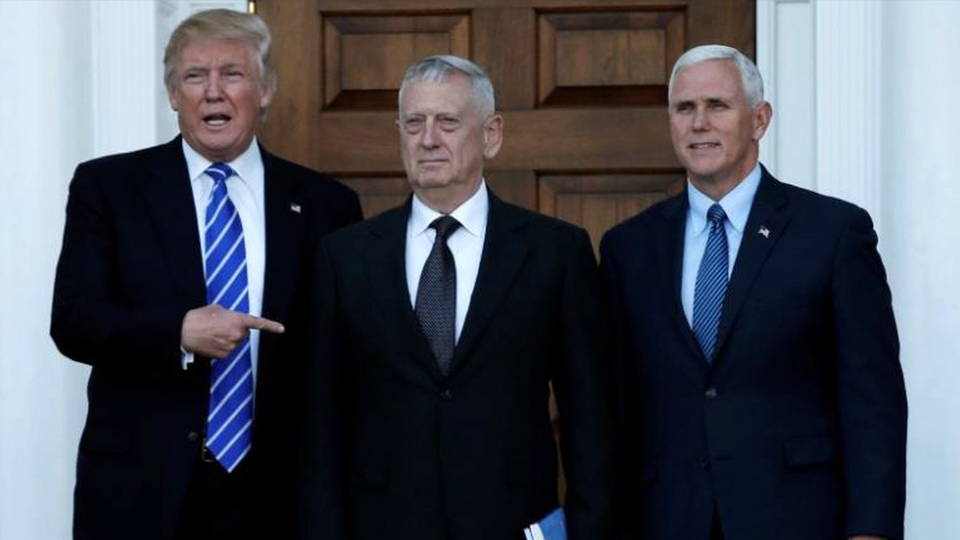
Donald Trump has chosen retired Marine General James Mattis to be defense secretary. Trump made the announcement during a victory rally in Cincinnati Thursday night. Donald Trump referred to retired General Mattis by his nickname "Mad Dog," which he reportedly received after leading U.S. troops during the 2004 battle of Fallujah in Iraq. Mattis enlisted in the Marines at 19. He fought in the Persian Gulf War, in Afghanistan and then in Iraq, where he served as a major general. In May 2004, Mattis ordered an attack on a small Iraqi village that ended up killing about 42 people attending a wedding ceremony. Mattis went on to lead United States Central Command from 2010 to 2013, but the Obama administration cut short his tour over concerns Mattis was too hawkish on Iran, reportedly calling for a series of covert actions there. Mattis has drawn criticism over his apparent celebration of killing, including saying in 2005 about the Taliban, "It’s a hell of a lot of fun to shoot them." Mattis only retired from the military in 2013, meaning he will need Congress to waive rules requiring defense secretaries to be civilians for seven or more years after leaving the military. The rules are in place to ensure civilian control over the U.S. armed forces. Already, New York Senator Kirsten Gillibrand has said she’ll vote against the waiver for General Mattis, saying, "Civilian control of our military is a fundamental principle of American democracy, and I will not vote for an exception to this rule."
TOPICS:
At Rally in Cincinnati Trump Repeatedly Attacks Media
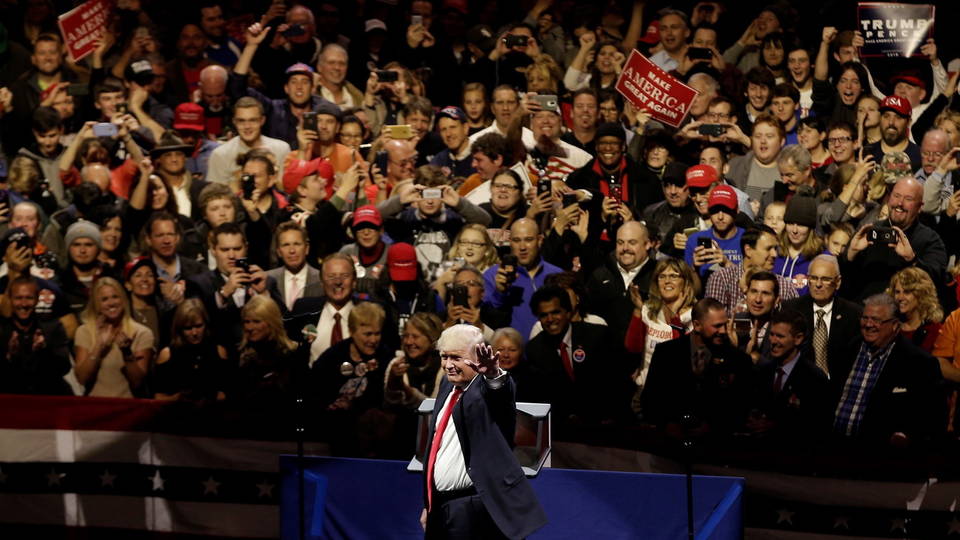
Trump’s announcement came amid a speech in a half-filled hockey stadium in downtown Cincinnati, during which his supporters renewed campaign chants, including "Build the wall" and "Lock her up"—a reference to Trump’s former opponent, Hillary Clinton. Trump repeatedly attacked the media as being "dishonest." He also claimed he won the election in a landslide—despite the fact that Hillary Clinton is now ahead in the popular vote by over 2.5 million.
TOPICS:
Sanders: Trump Carrier Deal Sets Dangerous Precedent for All Workers
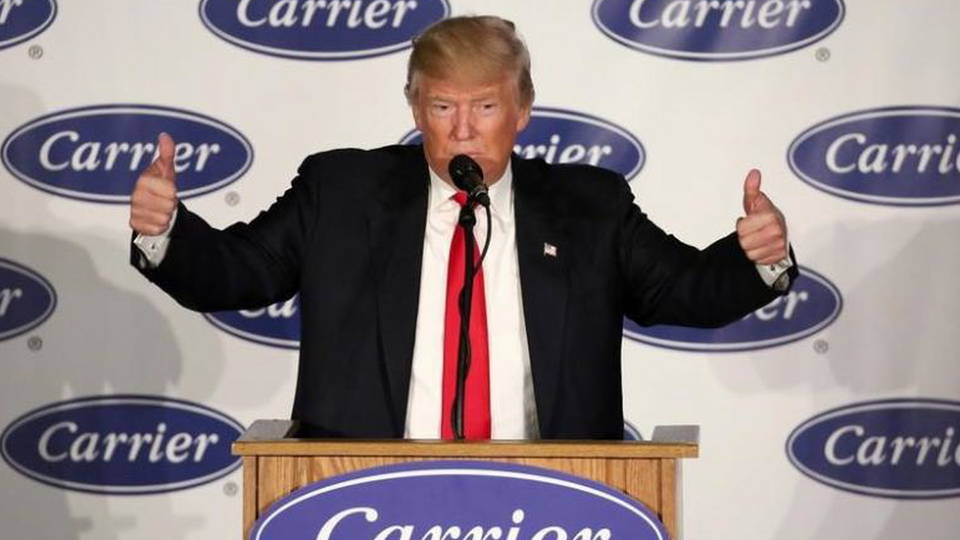
The speech in Cincinnati came after Trump spoke in Indianapolis, where he celebrated his involvement in Carrier’s decision to keep hundreds of jobs at its Indianapolis air conditioner factory instead of moving them to Mexico. Vermont Senator Bernie Sanders has criticized the deal to keep the jobs in the United States as setting a dangerous precedent, since Trump used a $7 million corporate tax break to convince the company not to ship the jobs overseas. This is precisely the type of tax break Trump said he was against during his campaign. Meanwhile, local reporter Rafael Sánchez, who has spent nearly a year investigating the Carrier plant and the proposed job relocation, says Carrier denied him press credentials for Trump’s speech yesterday. This is Sánchez.
Rafael Sánchez: "So many stories to tell. Now, unlike my colleague Katie Heinz, I was unable to be at the conference today, watch the announcement by Donald Trump. And that’s because my press credential was denied, which meant that I could not be inside the Carrier plant. It appears that after 10 months of telling the workers’ story, going to Monterrey, Mexico, and asking tough questions of a company, that all came with a price today."
Sánchez, who works for the Indianapolis station WRTV, also said that Trump did not save a full 1,000 jobs—and that at least 600 more Carrier jobs are still at risk of being shipped to Mexico.
Rafael Sánchez: "Here are the numbers: 720 of those jobs are production workers. Those are the folks that make the gas furnaces. About 300 of those jobs were the corporate jobs that were never going to leave anyway. So that’s where we get to the 1,100 or close to the 1,100. Here is the bad news in the short term: Unless something gets done, some 600 jobs are still scheduled to go to Monterrey, Mexico."
TOPICS:
Trump Considers Current & Former ExxonMobil CEOs for Secretary of State
Donald Trump has still not chosen his secretary of state, but new media reports say he is now considering two additional candidates: ExxonMobil CEO Rex Tillerson and former ExxonMobil CEO Lee Raymond. ExxonMobil is the United States’s largest oil company. It’s currently being investigated by a handful of attorneys general, following revelations that for decades the company covered up its own scientific findings linking rising carbon emissions to dangerous climate change.
Trump Issues Support for $3.8 Billion Dakota Access Pipeline

Donald Trump has expressed his support for the completion of the $3.8 billion Dakota Access pipeline, which has faced months of resistance from the Standing Rock Sioux, representatives from more than 200 indigenous nations from across the Americas and thousands of non-Native allies. In a communications briefing, Trump’s transition team said his support for the pipeline "has nothing to do with his personal investments." As of 2015, Trump had between $500,000 and $1 million invested in the pipeline company, Energy Transfer Partners, although Trump spokesperson Hope Hicks recently claimed Trump has sold off his shares in the company. This comes as North Dakota Governor Jack Dalrymple continues to back away from attempts to force water protectors to leave the main resistance camp, now saying authorities will not stop and fine people carrying supplies to the site. The governor says his recent executive order declaring the land an evacuation area sought only to warn people about the cold. In response, the Standing Rock Sioux said, "The Governor of North Dakota and Sheriff of Morton County are relative newcomers [here]. It is understandable they would be concerned about severe winter weather." The first of a group of as many as 2,000 veterans have begun to arrive at Standing Rock in North Dakota, where they say they’ll serve to form a "human shield" around the water protectors to protect them from the increasingly violent police crackdown.
TOPICS:
Minneapolis: Protesters Lock Down to Demand Wells Fargo Divest from Dakota Access Pipeline
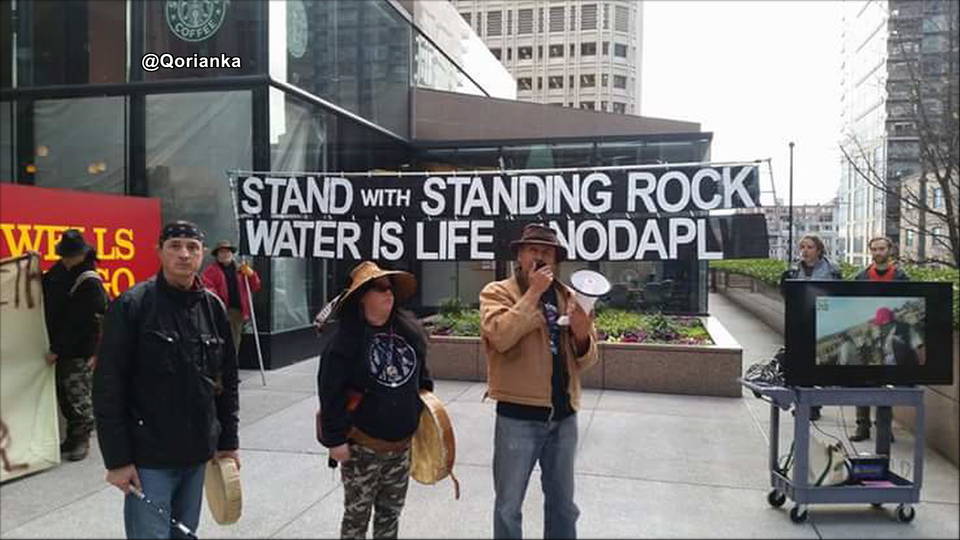
Meanwhile, protesters gathered in dozens of cities across the world Thursday in opposition to the Dakota Access pipeline, including in Tokyo, London, Vancouver, Calgary and cities across the U.S. In Minneapolis, six protesters locked themselves to each other inside a Wells Fargo office building, blocking the elevators for hours. They left only after receiving a letter saying Wells Fargo would meet with tribal elders before January 1 to hear their concerns about the bank’s investments in the pipeline.
TOPICS:
Canada: Mohawks Blockade Oil Freight Trains from Crossing Their Land

In Canada, members of the Mohawk Nation have begun blockading freight trains carrying oil by rail from crossing their territory, which lies along the St. Lawrence River near Montreal. They say the blockade is in solidarity with Standing Rock.
TOPICS:
Chippewas Sue Canadian Supreme Court over Enbridge Pipeline

Meanwhile, the Chippewas of the Thames First Nation have sued the Canadian government in Canada’s Supreme Court in order to challenge the permitting process for Enbridge’s Line 9 tar sands pipeline, saying their treaty rights to consultation were not met before the pipeline was approved. If the Supreme Court rules in favor of the Chippewas, it could set a precedent requiring formal nation-to-nation consultations between the Canadian government and First Nations for all future energy projects that would affect Native land.
TOPICS:
Students Hold 2nd Day of Action Demanding "Sanctuary Campuses"
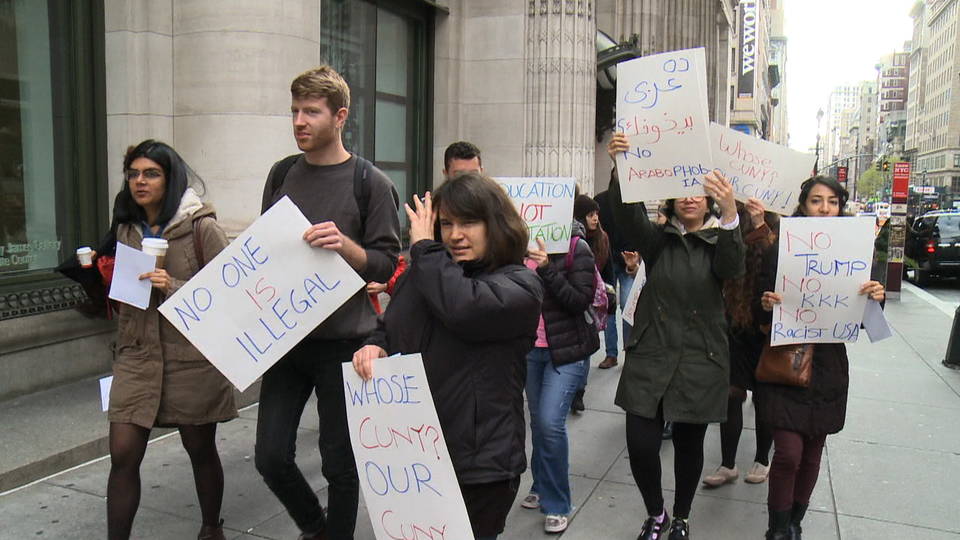
Back in the United States, students at campuses across the country protested Thursday, demanding their university or college become a "sanctuary campus." In the wake of Donald Trump’s promises to deport millions of people immediately upon taking office, students are demanding university administrators refuse to share information with immigration authorities, refuse to allow ICE agents on campus, and support equal access to in-state tuition and financial aid and scholarships for undocumented students. This is Thais Marques, a student at Rutgers University in Newark, New Jersey.
Thais Marques: "I’m undocumented, so this really matters to me because it directly affects my life. But also, like I’ve seen what deportations do to families. I’ve seen like the pain of my community is so deep. And this is just to show our community that it’s OK to come out as unafraid and unapologetic and really show our resilience that we’re going to fight. And this is only the first step."
TOPICS:
Pentagon Says Strike Killed 2 Dozen in Syria, But Groups Say Death Toll Much Higher

The Pentagon has acknowledged killing two dozen civilians in a U.S. airstrike in Syria in July—although some organizations say the death toll was considerably higher. The strike hit a village near Manbij in northern Syria. The group Syrian Observatory for Human Rights says as many as 200 civilians died in Manbij during a series of U.S. airstrikes in July.
French President Hollande Will Not Run Again in Next Year's Election
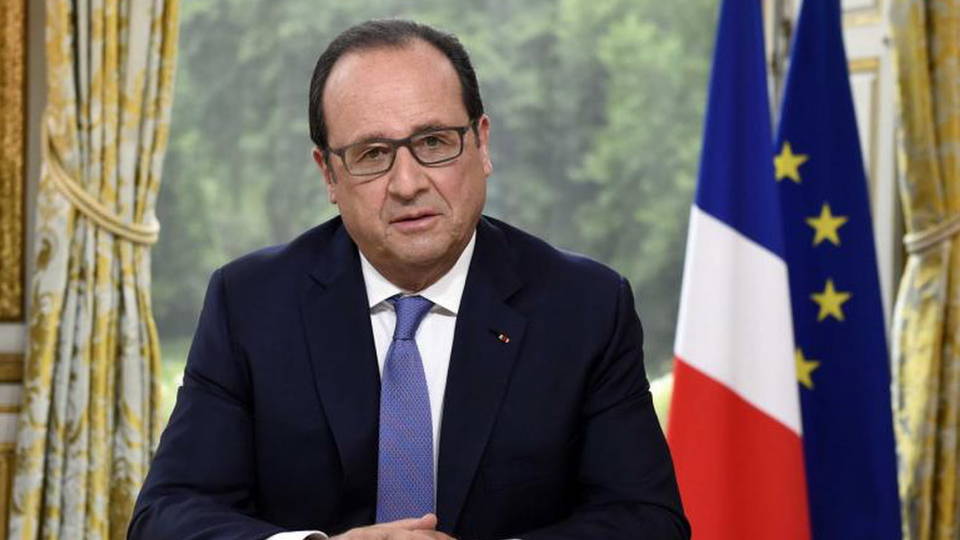
French President François Hollande has said he will not seek another term in next year’s election. Hollande is extremely unpopular in France. His approval ratings plummeted in part due to his aggressive backing of a deeply unpopular labor law reform, which sparked months of massive nationwide protests and strikes. On Thursday, Hollande, of the Socialist Party, said he would not compete in the upcoming elections because he didn’t want the only choice for voters to be between the conservative right and the far right.
TOPICS:
U.N.: Burma Army May Be Committing Crimes Against Humanity Against Rohingyas

Human rights advocates are increasing their criticism of the Burma military’s ongoing violence against Muslim Rohingyas in Burma’s north, which has sent more than 10,000 Rohingyas fleeing into neighboring Bangladesh. The military has reportedly burned whole villages and used helicopter gunships to open fire against Rohingya civilians. The entire area has been sealed by a military order in order to keep out aid workers and journalists. The U.N.’s human rights agency has said the violence may amount to crimes against humanity.
TOPICS:
Obama Admin Challenges Ruling Blocking Extended Overtime Bill
The Obama administration has challenged a federal judge’s November ruling that blocked the implementation of legislation to extend overtime pay to as many as 4 million Americans. The judge’s ruling came after 21 states and industry lobbyists sued to block the legislation.
TOPICS:
Cuba Continues Nine Days of Mourning for Leader Fidel Castro
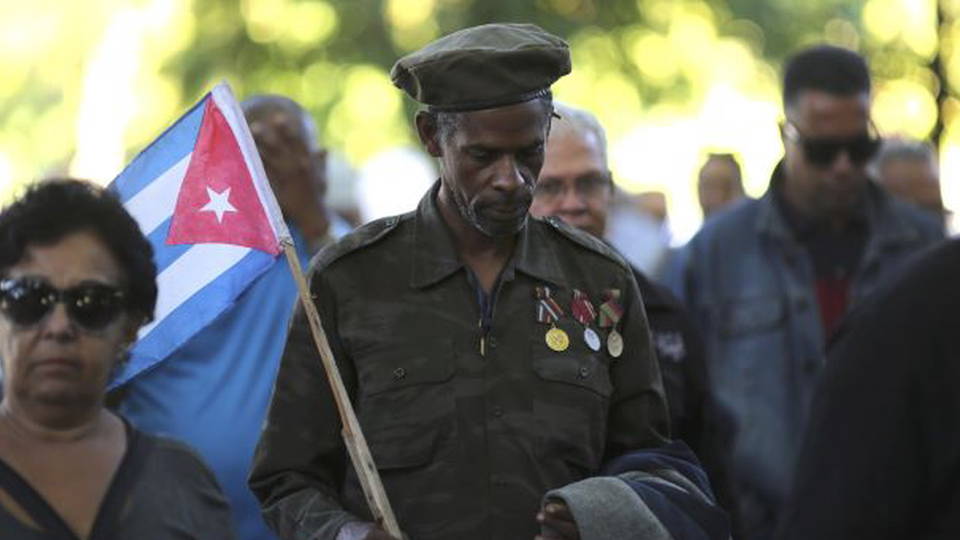
And Cuba continues its nine days of mourning following the death of revolutionary leader Fidel Castro. A caravan carrying Castro’s ashes has been traversing the country, where it’s been met by thousands of mourners. This is Ángel Santiesteban in Santa Clara—the town where Castro’s decisive revolutionary battle was won in December 1958. Within only hours of the city’s capture by Castro’s revolutionary forces, the U.S.-backed dictator General Fulgencio Batista fled Cuba, and Castro claimed victory.
Ángel Santiesteban: "Fidel is and will be the guiding example for all of the revolutions in the world. He will be the example, the guide and the beacon of light that shines a path for the restless in every country and every continent. Fidel will always be there, and we will follow his example."
TOPICS:
Donate today:
Follow:




CELEBRATE 20 YEARS OF DEMOCRACY NOW!

Coming Up: Stream Democracy Now!'s 20th Anniversary Celebration at the Riverside Church in NYC
WEB EXCLUSIVE

Watch Bernie Sanders' Full Speech in Philadelphia: The Future of American Democracy is at Risk
NEW BOOK

12/5 New York, NY
COLUMN

Senior TV Producer
-------
207 West 25th Street, 11th Floor
New York, New York 10001
-------
-------


No comments:
Post a Comment